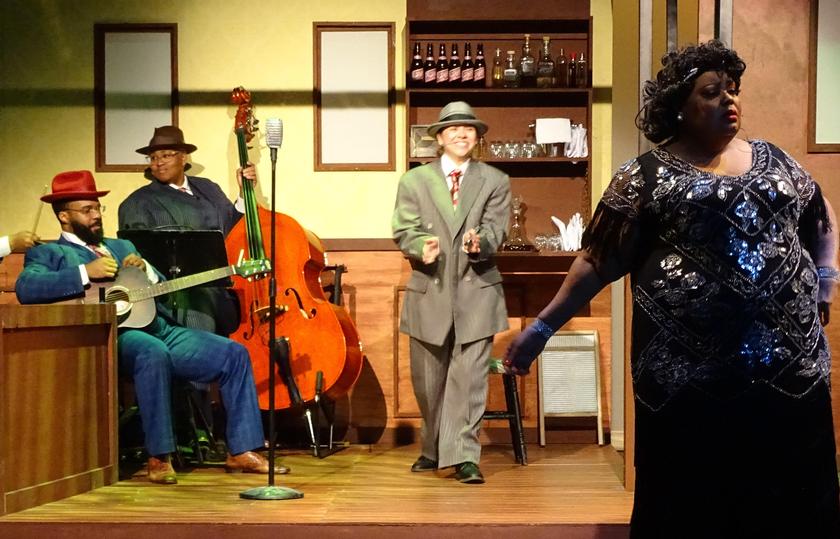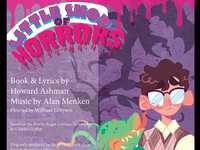- Sections :
- Crime & Public Safety
- Restaurants & Food
- Sports
- More
Pullman Porter Blues: A Train Ride into History
HOUSTON, TX -- I’ve only ridden S-Bahn Trains when I was stationed in Germany as a young soldier, traveling from Friedberg to Frankfurt looking for a good time, but it was nothing compared to the grandeur of the train that you will see on Track 29, boarding at The Ensemble Theatre in Midtown, Houston. For the Black porters it was a great gig if you can get it, in the midst of the Great Depression. You travel and wear a snappy uniform. You eat alright when you can. The good thing is you're not in a soup line, nor in a field picking things, or in some shop doing menial tasks. ‘Pullman Porter Blues,’ is the story of three generations of the Sykes Family (a representation of true circumstances), who are hardworking porters on the Panama Limited, a luxurious train that traveled from Chicago to New Orleans on June 22, 1937, the same day as the Joe Louis vs. James Braddock World Championship fight.
The play is intertwined with wonderful Blues Music, from a live band, and it will set your soul on fire. Yet, it’s played off of serious issues associated with racism of the era; of which the porters had to endure each time they boarded a train headed for a far off city. On top of that, you have familial struggles that multiple generations have to deal with, and the secrets that build up over decades that hurt when unearthed. PPB makes you want to laugh and cry, not to mention sing and dance, since many of the songs are recognizable to audience members, and I can say it was a privilege to have seen, and heard.
The play starts with Monroe Sykes (Anthony Boggess-Glover) a 50 year porter veteran, giving his 19 year-old college student turned summer porter grandson, Cephas Sykes (Aaron Cedric Phillips), a run down on the do’s and don'ts of being a porter and dealing with the white passengers; as well as the conductor Tex (Brian Broome). Cephas is eager to make his way in The World. He wants to earn his keep, but considers college a hindrance to the fact, while at the same time ignoring the harsh facts of porter life, a job he has been on for less than a day. Sister Juba (Regina Renae Hearne) arrives, a larger than life Blues entertainer, clad in a beautiful golden studded dress, tipsy from a morning’s haul, and singing ‘Wild Women Don’t Have the Blues.’ Unbeknownst to Monroe and Cephas, Sylvester Sykes (Ron John) a 30 year porter, the son and father of the family duo already introduced, welcomes the train passengers on board and tells them the porters are on-call for their every need no matter the time. Sylvester had arrived early off of another train, and was immediately put on the southbound caravan, unaware of the whereabouts of his father and son.
Meanwhile Cephas happens upon Lutie Duggernut (Kelsi Gallagher), a white 17 year-old stowaway, with the rancidity of a many weeks unwashed hobo; but she has a talent for the mouth organ, or French Harp (harmonica). The audience soon gets a taste of the racism on display when the conductor issues his first derogatory slur, drawing gasps from the audience. They soon find that the white man-in-charge has a special bitterness (traveling salty), towards Sylvester, who is fighting for better working conditions for the Pullman Porters, with his membership in the Brotherhood of Sleeping Car Porters Union (in many ways the forerunner of the Civil Rights Movement). Sylvester soon finds that he is on the same train with his father, but when he sees Cephas, his son; in a porter’s uniform, he is livid. Sylvester and Monroe, have sacrificed greatly for their young man to maintain a place at a university in Chicago, with hopes of becoming a doctor someday. Unfortunately, smart as a whip Cephas, does not understand the 80-years experience in train life of his forebears, and the often demeaning nature of the work involved. Monroe sees Cephas’ work as seasonal before heading back to the books, while Sylvester never wanted to never expose his son to the profession in the first place; and situations such as shown have been reflected in so many families who did not emerge from the middle class or higher at the time, and since.
Audience members find evidence of a past romance stamped out between Sister Juba and Slyvester, and a potential romance between Cephas and a strikingly cleaned-up Lutie, taken in by Sister Juba after some initial conflict to wash away her dirt and odorous whiffability. The Queen of Blues soon finds Lutie’s talent with her harp, and invites the young lady to play a set with her. The First Act concludes with the joy of Joe Louis' victory over James Braddock, and sets the tone for all the twists and turns later on down the track, in a play you have to see.
Playwright Cheryl West used the first hand account of her grandfather, who was an actual porter to write her 2012 masterpiece. West herself as a very young girl, remembers being idolized by the porters on her trips from Chicago to Mississippi with her grandmother. It wasn’t until West started researching and writing the play, that she found out the harsh realities of the porters; who although exhibited a welcoming grin to all, were dragged down by the realities of the train's white overseer and the passengers themselves. Director Chuck Smith, visiting from Chicago and its famous Goodman Theatre, has taken his previous experience in directing PPB for the stage, and created an exceptional product worthy of a place in history, and deserves greater recognition outside of D.C., Chicago, and Houston.
Clutch City has a great wealth of acting and singing talent, and Smith wasted no time in garnering the best actors possible in both the Black and White roles. All you have to do is close your eyes, and you are in a sound studio listening to exceptional voices providing a brilliant chorus that is as close to perfection as sitting at the right hand of the big guy upstairs. I especially appreciated ‘This Train’ (is Bound for Glory), sung by Boggess-Glover, John, and Phillips. It’s an homage to one of my Blues and Gospel Heros, Sister Rosetta Tharpe, who sang the song for most of her life. In fact, I have it on my Church playlist when driving to services every week. ‘Sweet Home Chicago,’ was memorable, as well as Regina Hearne’s ‘Hop Scop Blues.’ Both Hearne and UH Acting Alumna Kelsi Gallagher, teamed up for ‘Greivin’ Hearted Blues.’ Gallagher, fresh out of school, made her debut at The Ensemble with PPB, and played a convincing hobo, thankfully without the aforementioned odor. And even though her harp music was a fantasy, she still played it convincingly. Brian Bloome’s the train conductor, was a necessary part played very well, although he doesn’t have a racist bone in his body. And the same goes for Gallagher as well.
PPB was a mini-Blues concert in itself, and it was a sight to see. The live band consisted of Urica Fernandez (bass), Quincy Cotton (guitar), Chika Kaba Ma’Atunde (piano), and Darren Coleman (drums), and it’s worthy of being recorded. If the theater had soundtracks ready for sale, I would have bought one. The musical director Ma’Atunde, did a most excellent job with his crew, and although it was billed as a ‘play with music,’ it was a musical in its own way.
The set was beautifully constructed, and The Ensemble’s Set Designer Santiago Sepeda, and the construction team have never disappointed. Choreographer Aisha Ussery, who also did ‘Beatbox: A Raparretta,’ again surpassed expectations. I was also impressed with the costumes (Sarah Smith) and the attention paid to their authenticity for the era. Beautifully done all. I highly recommend Pullman Porter Blues to everyone, especially with parents and grandparents, who have spent lifetimes working hard so their children and grandchildren can live better and less labor intensive lives. Life boils down to sacrifice and experience. And the longer you have seeped, the more you have to pass on to others, not necessarily monetarily, but in the wisdom gained in working hard, but also in smarts, and passing that knowledge onto the next generation.
I’ve grown quite attached to The Ensemble Theatre. I’m continually awestruck by the talent on tap, and the amazing stories that enchant and engage the audience in wanting more. In fact, I want more, and I'm looking forward to the 2024-2025 season starting in September with ‘Stew.’
See you at The Ensemble Theatre!
The show runs through July 28th. For tickets and donations: ensemblehouston.com
Ruben can be reached at: ruben@montgomerycountynews.net








